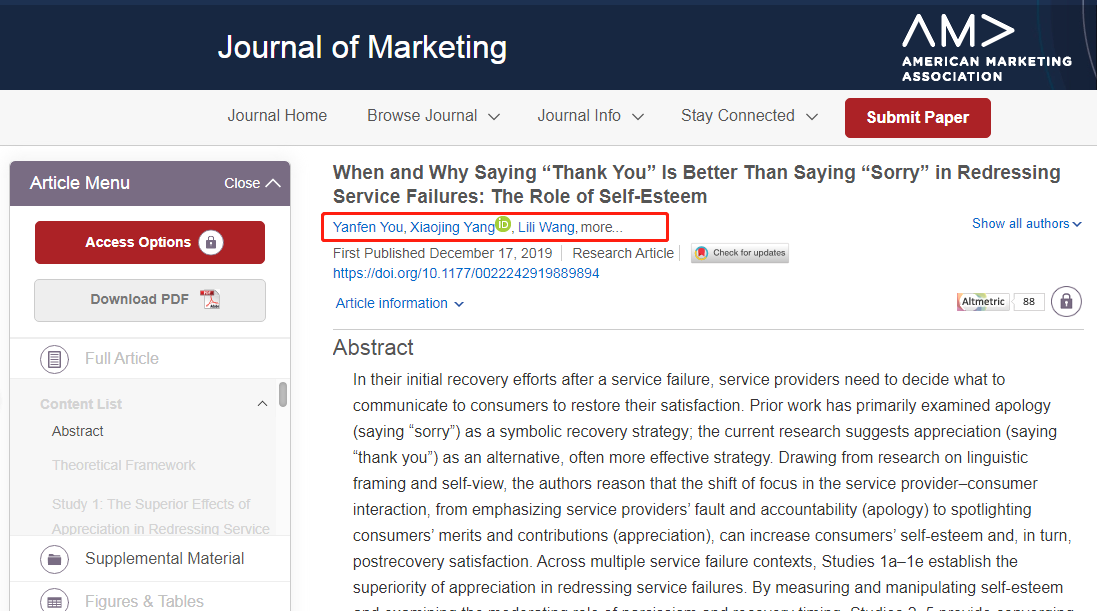A special survey on chairmen and CEOs of the top 500 enterprises in FORTUNE Magazine show that 80% of the respondents believe that modern enterprises will inevitably encounter crisis, just as people are bound to face death.
In fact, almost every enterprise has encountered various crises, and the crisis is often caused by the wrong response to a small "mistake". For example, the take-away deliveryman of a certain brand arrived 2 hours late and spilled the food. When facing customer complaints, he not only had a bad attitude, but almost fought with the customer. This incident quickly attracted the attention of netizens and the media, thus this brand fell into a media crisis.
In the daily scene of consumption, thousands of such incidents are reported. In the face of service failure or delay, what should we do to avoid the crisis? The current practice of many businesses is basically saying "sorry" immediately. However, Associated Prof. Wang Lili and her team have found that appreciation is better than apology in improving customer satisfaction and avoiding crisis when service failure or delay occurs.

Why Is "Thank You" Superior to "Sorry"?
In March 2020, Associated Prof. Wang Lili and her team published an article entitled "When and Why Saying ‘Thank you’ is Better Than Saying ‘Sorry’ in Redressing Service Failures: The Role of Self-Esteem" in worlds top Journal of Marketing (one of UTD24 journals of management).

This article suggests that when the service failure or delay occurs, apology emphasizes the business fault and accountability to a certain extent, while appreciation (such as "thank you for your patience") spotlights consumers merits and contributions, so as to increase consumers self-esteem and satisfaction. At this point, many people may think, "material compensation is more useful than appreciation". It is worth mentioning that service recovery is mainly divided into symbolic compensation (psychological compensation) and functional compensation (monetary or material compensation), and this article mainly focuses on the effect of symbolic compensation. There are a lot of comparative studies on symbolic compensation and functional compensation in the earlier literature, and symbolic compensation mainly discusses "how to apologize for fault". The research of Associated Prof. Wang Lili and her team has found a new perspective for exerting the effect of symbolic compensation.
This research mainly from the perspective of linguistic framing and self-esteem to study "how can businesses more effectively make up for their mistakes in service (such as late delivery, the quality of goods does not meet customer expectations, etc.) and improve the consumer satisfaction". In addition to proving the mediation mechanism for enhancing self-esteem by using several research methods, the research also found that:
Firstly, the advantage of appreciation strategy over apology strategy only exists after the fault occurs, but does not exist before the fault occurs; Secondly, the effectiveness of appreciation strategy is roughly the same as appreciation and apology combination strategy; thirdly, on the basis of functional compensation provided by businesses, the advantage of appreciation strategy over apology strategy still exists.
Why the research was conducted?
“This topic mainly came from my daily life experience.” When it came to “Inspiration” for research, Wang said that the product crisis management has always been the biggest vortex with which the enterprise marketing shall meet. The crisis could be transformed into opportunity if dealt with properly; and the crises could also devour everything the enterprise has painstakingly established in just a blink of eye.
However, we always tend to consider the product crisis management in the aspect of strategy in the field of marketing, and it could be easy to neglect the things like “Product Crisis” that appear in the daily consumption, especially in the scene of service. For instance, the delay in catering service, delay in courier service, overbooking in air service, delay of baggage, and wrong shipment, etc.
These service delays and service failures only appeared on individual level, as a consequence, enterprises were basically not intending to conduct crisis management in the aspect of strategy, or hold a press conference targeting the very delays and failures without the hype of media. So, under most of the circumstances, dealing with “Product Crisis” like delays or service failures depends entirely on the coping ability of front-line employees. Unfortunately, the current research on this aspect is relatively lacking. “That was why we have initiated the research, with a simple purpose to provide scientific and effective advice for front-line employees of the enterprise, or for the business dealers, on words they were supposed to say when service delays or service failures occur” said Wang.